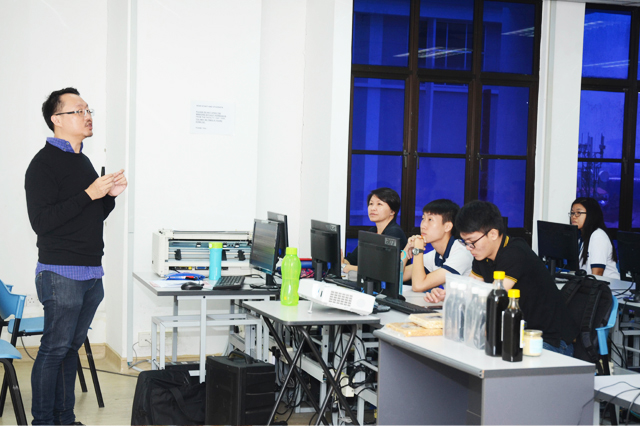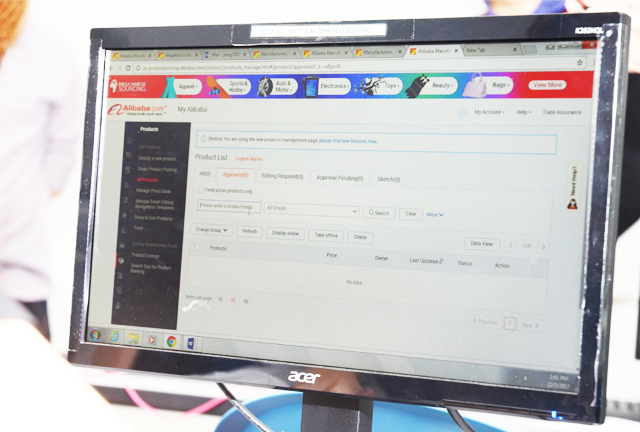
E-commerce for a sustainable future
Opportunities arise from the internet, emerging technologies and innovations should benefit all, especially communities in the rural or remote areas. In its effort to provide access to the New Village communities to obtain these opportunities, UTAR has constantly conducted various activities for them through its UTAR New Village Community Project (UNVCP). Stepping up on that effort, the university launched the UTAR New Village E-Commerce Project in 2017 with the main aim to link the new villages to the small and medium-sized enterprises (SMEs) through the adoption of digital marketing and e-commerce with training and guidance from the UTAR students and staff. Having provided the New Village communities with knowledge, skills and economic improvements, UTAR also hopes that the e-commerce project will improve the commercial value of their products and expand their product market beyond the villages.
For UTAR, it was more than just giving back to society. It was, in fact, to help the New Village communities to take advantage of e-commerce to drive sustainability in their own respective villages, especially on tackling poverty issue, which is also emphasised in the United Nations’ (UN) Sustainable Development Goal (SDG) 1 – No Poverty. Having enabled to market their local products through e-commerce platforms would be an ideal solution to expand their products’ marketability and customer base, including internationally. Also, not having to incur additional cost to advertise their local products because various e-commerce platforms are made available for free. With more people becoming aware of their local products, it would also create opportunities to invite customers to visit the New Villages, to see for themselves how the products are made. This would again benefit and further boosts their local tourism economy.
The e-commerce project also strengthens UTAR’s emphasis on quality education, as also highlighted in SDG 4 – Quality Education. Students who participated and assisted the communities of New Villages through this project have also learnt much knowledge and skills, especially those related to e-commerce. Having their e-commerce experience elevated, the project has indeed become a learning and practical platform for them to apply the e-commerce skills learnt in their classrooms.
As students learnt, the New Village communities learnt as well, and they gained enhanced e-commerce knowledge. With that knowledge, the communities would understand the e-commerce potential for driving inclusive growth and sustainable development by empowering their local businesses and transforming them into entrepreneurs and traders. That way, women too, regardless of young or old, are given the opportunity for obtaining empowerment. This would also achieve SDG 5 – Gender Equality, whereby women are also prioritised.
Looking upon the issue of young people migrating out of the villages into major cities for better employment opportunities, the e-commerce project would also be one of the solutions for the residents of the New Villages to retain these young people in the village and help develop the village with their ideas, creativity and innovations. For that, the e-commerce project looks on SDG 8, - Decent Work and Economic Growth, which aims to promote sustained, inclusive, and sustainable economic growth, full and productive employment and decent work for all.
This solution is evident through the launch of the UTAR-Alibaba Entrepreneur Project. The aim was to promote local products from respective New Villages on e-commerce platforms, such as Lazada.com, PrestoMall (previously 11street) and Alibaba.com. It also helped the villagers to expand their business online locally and internationally. Some of the local products that are sold online included, Kicap Cap Tangan Bentong, CB Red Label Chicken Biscuit, CB Red Label Honey Sa Qi Ma Cookies, Bai Li Xiang Zhen Siong Chuan Rendang Sauce, Bai Li Xiang Zhen Siong Chuan Sambal Ikan Bilis and Hock Chew So Mee Shua. This project is run by students and is developed under the aegis of UNVCP. FAM Department of Building and Property Management Head Low Chin Kian also gave training to students to better equip themselves and help the villagers to sell their products online.

Some of the products available online

Low (standing) giving training to students

Alibaba.com being used as a training platform
The effort was further strengthened when UTAR and Alibaba.com signed a memorandum of understanding (MoU) on 6 September 2016 to better equip UTAR students and staff as well as Malaysian SMEs with e-commerce knowledge. UTAR’s involvement in the Global E-commerce Talents (GET) programme which is powered by Alibaba.com also helped students, small and medium-sized business professionals and entrepreneurs to learn the required competitive skills and to make available the essential resources required to build their mettle in the global e-commerce industry. The GET programme managed to bridge the gap of productivity by providing a new platform for traditional products in the New Villages to be promoted on the e-commerce platforms.
Looking upon SDG 9 – Industry, Innovation and Infrastructure, it is also hoped that the UTAR New Village E-Commerce Project will help these local New Village businesses gain access to financial services, including online and mobile payments and their integration into the virtual marketplace.
![]()
![]()
![]()
![]()
![]()
© 2020 UNIVERSITI TUNKU ABDUL RAHMAN DU012(A).
Wholly owned by UTAR Education Foundation Co. No. 578227-M LEGAL STATEMENT TERM OF USAGE PRIVACY NOTICE